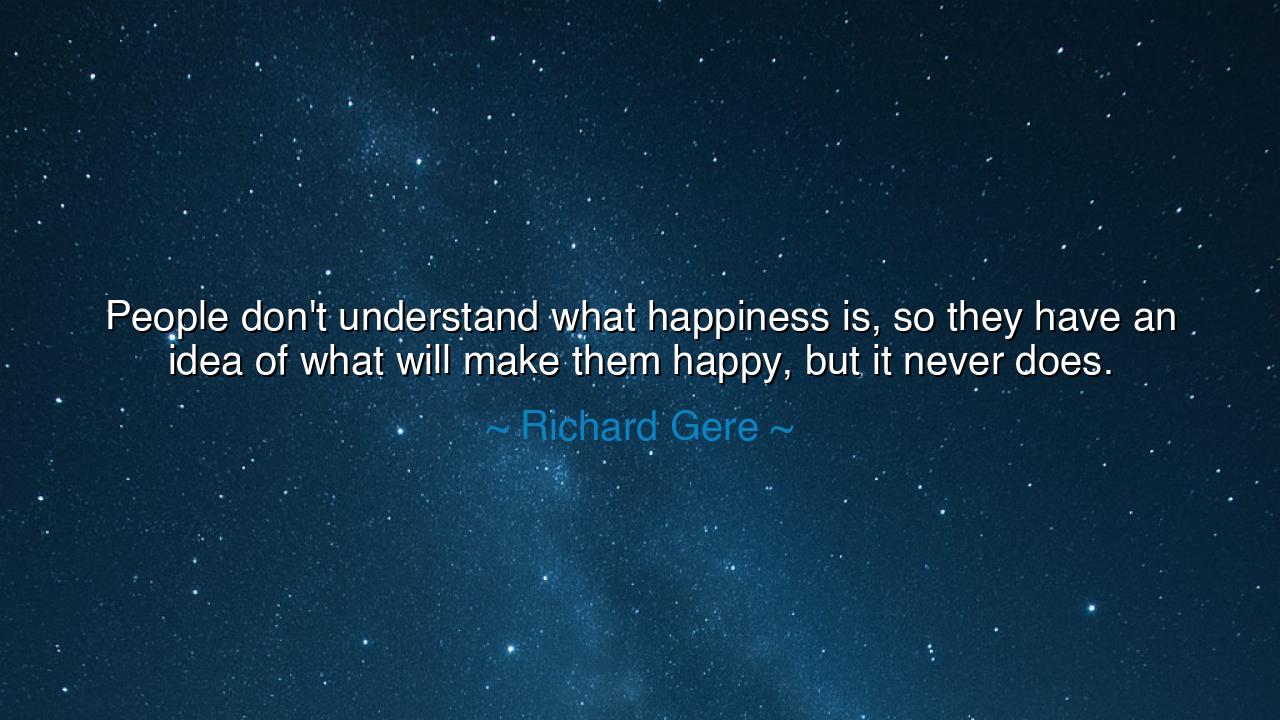
People don't understand what happiness is, so they have an idea
People don't understand what happiness is, so they have an idea of what will make them happy, but it never does.






“People don’t understand what happiness is, so they have an idea of what will make them happy, but it never does.” — thus spoke Richard Gere, the seeker and sage disguised as an actor, a man who has walked through the halls of fame and found that glitter cannot feed the soul. In these words, he unveils one of the oldest illusions that haunt humankind — the confusion between happiness and its shadow, desire. Men chase pleasure, wealth, love, or status believing these things to be the source of contentment, but when they finally hold them in their hands, they find only emptiness. Gere speaks with the tone of one who has seen the mirage dissolve — who has looked within and discovered that happiness was never in the object, but in the heart that perceives.
The origin of his insight lies in the spiritual traditions that have shaped his life. Richard Gere is a devotee of Buddhist philosophy, which teaches that suffering arises from attachment — from our mistaken belief that external things can satisfy an internal hunger. The Buddha taught that desire, like fire, consumes what it touches and always seeks more. Thus, people move endlessly from one craving to another, mistaking motion for meaning. Gere’s reflection echoes this timeless wisdom: we do not suffer because we lack happiness, but because we misunderstand it. We think it can be bought, achieved, or possessed, when in truth it can only be awakened.
Throughout history, the wise have wrestled with this same truth. Epicurus, the philosopher of serenity, said that happiness comes not from abundance, but from the mastery of desire — to need less, not to have more. And Marcus Aurelius, the Roman emperor and Stoic, wrote, “The happiness of your life depends upon the quality of your thoughts.” Both men lived amidst power and temptation, yet discovered that peace lies in inner discipline, not outer triumph. Gere, following in their path, warns the modern soul that the world’s promises are hollow idols. We chase the dream of happiness through possessions and praise, but each attainment fades, leaving us thirstier than before.
Consider the tale of Howard Hughes, once among the wealthiest and most admired men of his time. He had everything the world could offer — fortune, fame, brilliance — yet died isolated and tormented, a prisoner of fear and obsession. His tragedy was not madness alone, but the same misunderstanding Gere speaks of: he believed happiness could be built upon success and possession. But happiness is not a structure; it is a state of being. Those who seek it outwardly are like men building palaces upon sand. When the tide of life comes, all their treasures are washed away.
Happiness, as Gere implies, is not a prize to be won, but a harmony to be found. It arises when one’s soul is in accord with the moment — when gratitude replaces greed, when presence silences the mind’s endless wanting. The child who laughs at the simplest game, the monk who sits beneath a tree in silence, the mother who feels joy in a small gesture of love — these understand happiness in its truest form. They have no need to imagine what will make them happy, for they are already at peace with what is. Happiness, in this sense, is not something to gain, but something to remember — a truth we once knew, before the noise of desire drowned it out.
Yet, this misunderstanding is not born of malice, but of forgetfulness. The modern world teaches us that happiness lies always beyond the horizon — in the next purchase, the next promotion, the next love. And so we wander, restless and unsatisfied, measuring our joy by comparison and craving. Gere’s words call us back to simplicity — to sit still and ask, “What is this happiness I seek?” In that stillness, we may find that the joy we long for has never left us; it has only been buried beneath our ideas of what life should be.
Therefore, my children, take this wisdom to heart: do not chase after happiness as though it were a bird forever fleeing your grasp. Sit quietly, and you will find it nesting within you. Be grateful for the small moments — the warmth of sunlight, the laughter of a friend, the breath that fills your lungs. Learn to want less, and you will have more than kings. As Richard Gere reminds us, the greatest illusion is that happiness lies somewhere else — when in truth, it begins here, now, in the quiet recognition of what already is.
And so, remember this teaching: happiness cannot be hunted, bought, or conquered. It is the gift that blooms when the heart ceases to strive and learns to see clearly. Live not for the idea of happiness, but for the experience of presence. For only when you stop chasing the dream will you awaken to the truth — that you were already happy, and the world was already enough.






AAdministratorAdministrator
Welcome, honored guests. Please leave a comment, we will respond soon